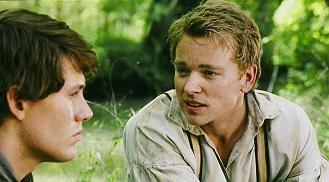

The Work and the Glory is different from the other Mormon films released. For one, it has two unmarried people kissing. Yikes! Okay, here's the catch - they aren't Mormon. In fact, at the beginning of the film, there is no Church of Jesus Christ and Latter Day Saints. At least not yet. The Work and the Glory takes place in 1820s upstate New York, and is based on the first in a series of novels by Gerald N. Lund. For the most part, it follows the Steed family as they adjust to life different from their home state of Vermont, but there's also this guy that lives nearby named Joseph Smith. The production value of this film was impressive. This, along with the recent Saints and Soldiers shows a promising step forward for Mormon-themed films in terms of looking like a big time Hollywood film.
It still doesn't feel like one. The great pitfall of religious films is that they tend to be insular. They preach to the converted. Mormons will inevitably love this film because it provides a fictional account of the very beginnings of their religion. Non-Mormons will probably find it okay, but not see what all the fuss is about. The worst element of The Work and the Glory is that it gets a bit preachy at times, and comes off as too simplistic. The good guys are handsome, blond, and blue-eyed. They dress neatly, and speak politely. The bad guys are unshaven, wear dark clothes, and have darker-colored hair. And it's well known that early Mormons suffered much intolerance at the hands of others. Adapter/director Russell Holt inserts some truly awful dialogue near the end about the virtues of tolerance and the importance of respect.
Holt provides, through the Steeds, and outsider's look at the origins of the Mormon Church. At this point, everybody thinks Smith (Jonathan Scarfe, Judas, Mafia Doctor) is a crazy man. He keeps telling people about visits by angels and hidden golden tablets containing words from God. Benjamin Steed (Sam Hennings, The Aviator, Squint) hires Smith and his brother to help work the new Steed farm, oblivious to the rumors. Steed's two sons, Nathan (Alexander Carroll) and Joshua (Eric Johnson, Ginger Snaps: Unleashed, Texas Rangers) take two very different paths. Nathan befriends Will Murdock (John Woodhouse), a guy from the wrong side of town. He strays from his family, begins drinking, and plots to steal Smith's tablets. Joshua befriends Smith. He's curious about the tablets, and wants to know more about Smith and his experiences. Although everybody claims that the Smiths are loony, Nathan can see firsthand that Joseph and his family are good, hardworking people. The Smith character is just too uninteresting to care about. There is a problem here that Holt runs into that has no solution. Flawed characters are inherently more interesting, because they are not perfect. They struggle with things, and through these struggles can become better people. Joseph Smith is an icon to the entire Mormon Church, and it is perfectly reasonable to assume that Holt will not portray him as flawed. But by doing this, he becomes very dull.
Then, Holt make things even more Hollywood, Holt sets up a love triangle between Nathan, Joshua, and Lydia McBride (Tiffany Dupont, Cheaper by the Dozen), the attractive young daughter of the local shopkeeper. Holt is trying to play up the drama by splitting the Steed family down the middle. One brother takes the high road, and the other strays significantly, and their affections for the same woman increase their rift. If not for the cheesy dialogue and simplistic nature of the film, The Work and the Glory would probably fare better. As it stands, the film is overly long and has a tendency to drag. As an outreach tool, it does not work because it fails to say anything at all about the beliefs. Nathan knows that Smith is a good person, and reading the Book of Mormon convinces him that Smith is right. Holt never enlightens his viewers on what about the book convinced Nathan or the others, just that Smith was a good man, and the symbols on the scrolls looked ancient.